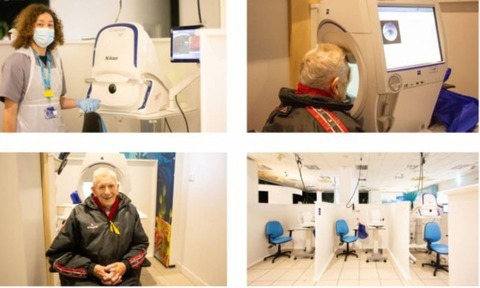Shopping mall technicians ‘offer solution to NHS eye appointments bottleneck’
14 Jul 2025

Technician staffed virtual eye clinics in shopping centres can help significantly reduce serious appointment bottlenecks, concludes a UCL-led study.
The research focused on one clinic operating at London’s Brent Cross shopping centre since September 2021 – the height of the Covid-19 pandemic.
Whereas nationally, the lockdown saw a massive appointments backlog 18 months later, the hospital network hosting the Brent Cross site reported a different trend.
During the first five months of the clinic’s operation, delays to appointments across the Moorfields Eye Hospital network fell by more than eight days for each week that passed, said the researchers, writing in BMJOpen.
While, in November 2021, patients with stable chronic conditions across the network were being seen six months late, by April 2022 the figure had dropped to two months.
In contrast, the Association of Optometrists calculated that by March 2023, some 628,502 people in England were waiting for appointments, including 27,260 waiting for a year or more.
Lead author Siyabonga Ndwandwe of UCL research department of primary care and population health said the research highlighted a scalable model that could be adopted more widely to improve access and efficiency across the whole of the NHS.
Virtual clinics employ technicians for routine scans during regular check-up appointments, to be examined later on by a clinician. Technicians without prior healthcare experience were trained to perform the scans, with continuing support from senior clinicians.
Remarked Ndwandwe: “Our findings suggest that community-based, technician-led virtual review clinics could play a significant role in reducing wait times for patients with stable chronic eye conditions.
“This is especially relevant given current NHS challenges, including chronic workforce shortages – particularly among eye specialists – and limited hospital estate capacity.”
The study was limited by the absence of an external control group and the fact it focused on glaucoma and medical retina patients, although the clinic expanded to include cataract patients and newly referred patients in 2022.
However, overall, it analysed data from 69,257 appointments attended by 39,357 patients with stable glaucoma and medical retinal conditions at sites across the Moorfields Eye Hospital network in London between June 2018 and April 2023.
Pic: Moorfields Hospital

